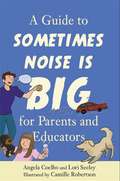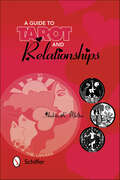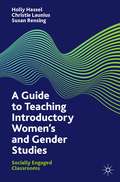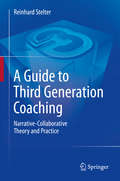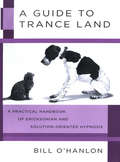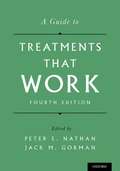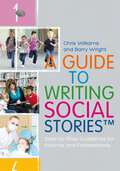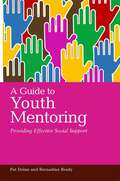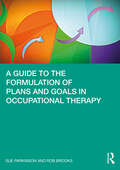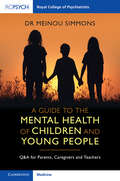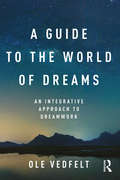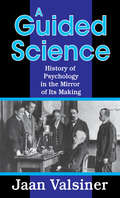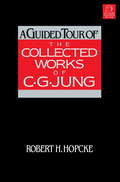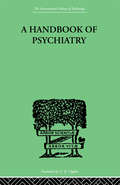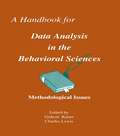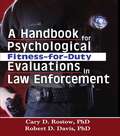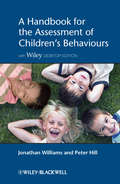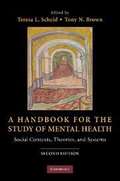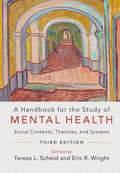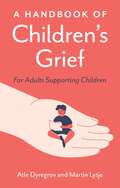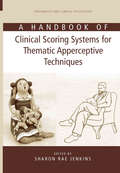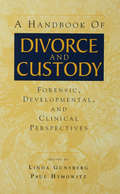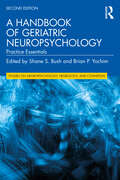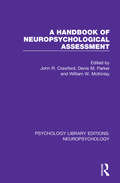- Table View
- List View
A Guide to Sometimes Noise is Big for Parents and Educators
by Angela Coelho Lori Seeley Camille RobertsonUnderstand how children with autism experience the world around them with this simple guide. Learn why they might react unexpectedly to lights, noise, and even seemingly simple requests, and what you can do to help reduce sensory overload. This accompanying guide to the children's picture book Sometimes Noise is Big takes the illustrations and gives a breakdown of what is happening in each picture, with practical tips on how to help children who struggle with sensory issues. This book can also be used as a standalone resource, and is ideal for supporting children aged 5+ with autism at home, in the classroom, and for raising awareness of autism and sensory issues.
A Guide to Tarot and Relationships
by Andria K. MolinaUse the Tarot to bring about and enhance all of your relationships! Conscious thought process can be reflected through the symbolism and the language of Tarot – now, via your specialized card readings, you can identify key issues and helping aids to repair or improve your personal relationships. Enable patterns of constructive development into your psyche, find answers for love and self exploration, or discover time frames for events that affect your relationships. A Questions Statement is applied to each card to help you identify questions and to creatively form compelling answers. In addition to metaphorical meanings for each card, a general significance section is included for usage with other life issues. Modern-style illustrations by artist Delores Fitchie accompany the instructions.
A Guide to Teaching Introductory Women’s and Gender Studies: Socially Engaged Classrooms
by Christie Launius Holly Hassel Susan RensingThis book provides a practical, evidence-based guide to teaching introductory Women's and Gender Studies courses. Based on the findings of a Scholarship of Teaching and Learning project that analyzed 72 Intro students’ written work, the authors equip instructors with key principles that can help them adapt their pedagogy to a range of classroom environments. By putting student learning at the center of course design, the authors invite readers to reflect on their own investments in and goals for the introductory course. The book also draws on the authors’ combined decades of teaching experience, and aims to help instructors anticipate the emotional, intellectual, and interpersonal challenges and rewards of teaching and learning in the introductory WGS course. Chapters focus on course design, including identifying desired learning outcomes (in terms of course content, skills, and dispositions or habits of mind); choosing course materials; pedagogical activities; and assessing student learning. This book will be an invaluable resource for experienced WGS instructors and those seeking or planning to teach it for the first time, including graduate students and high school teachers.
A Guide to Third Generation Coaching: Narrative-Collaborative Theory and Practice
by Reinhard StelterThis book proposes third generation coaching in a form where the coach and the coaches are less concerned with solutions and more concerned with creating space for (self-)reflection through collaborative practices. Offering a revisited and innovative approach to coaching psychology, advantageous for learners and practitioners alike. It marks a new trend in coaching and has a special profile, based on the acknowledgement of changes in society, learning and knowledge production, as well as leadership. The author' s concept of coaching distinguishes itself from the existing models (pop coaching , GROW model, etc) by offering a fresh analysis of our society - a society that is characterised by diversification, identity challenges, abolition of the monopoly of knowledge, lifelong learning, the necessity for self-reflection, etc. These societal changes are the basis for the existence of coaching and its prevalence, but they must also be the foundation for the way we employ coaching.
A Guide to Trance Land: A Practical Handbook of Ericksonian and Solution-Oriented Hypnosis
by Bill O'Hanlon<P> A friendly and brief guide to the essentials of hypnosis. <P> Popular author Bill O’Hanlon offers an inviting and reassuring guide to the essentials of hypnosis, alleviating the newcomer’s anxieties about how to make the most of this clinical tool. This brief book illustrates the benefits of solution-oriented hypnosis, which draws on the work of the pioneering therapist Milton Erickson (with whom O’Hanlon studied) and emphasizes doing what is needed to get results—which, more often than not, means trusting that the client holds within him- or herself answers or knowledge that need only be tapped or released by the therapist. <P> O’Hanlon covers the key aspects of hypnosis, including: using possibility words and phrases; using passive language; and inducing trance. O’Hanlon offers practical tips and friendly encouragement for the novice hypnotherapist—in his characteristic warm, reassuring, and humorous style.
A Guide to Treatments that Work
by Peter E. Nathan Jack M. GormanLike its predecessors, this fourth edition of A Guide to Treatments That Work offers detailed chapters that review the latest research on pharmacological and psychosocial treatments that work for the full range of psychiatric and psychological disorders, written in most instances by clinical psychologists and psychiatrists who have been major contributors to that literature. Similarly, the standards by which the authors were asked to evaluate the methodological rigor of the research on treatments have also remained the same. Each chapter in A Guide to Treatments That Work follows the same general outline: a review of diagnostic cues to the disorder, a discussion of changes in the nomenclatures from DSM-IV to DSM-5, and then a systematic review of research, most of which has been reported within the last few years, that represents the evidence base for the treatments reviewed. In all, 26 of the volume's 28 chapters review the evidence base for 17 major syndromes.
A Guide to Writing Social Stories™: Step-by-Step Guidelines for Parents and Professionals
by Chris Williams Barry WrightSocial StoriesTM are a widely used and highly effective intervention for supporting children on the autism spectrum, but it can feel overwhelming to follow all the rules put in place to create personalised stories. Developed with the input of parents and professionals, and informed by new Social Stories research, this is a comprehensive, clear, easy step-by-step guide to writing effective personalised Social StoriesTM that give children social information, creating many benefits for them. The book includes many examples of real Social Stories created for children by parents and teachers working together, and handy downloadable checklists that highlight the essential components of a Social Story, helping to ensure that each story you write achieves the best possible results.
A Guide to Youth Mentoring
by Pat Dolan Bernadine BradyYouth mentoring can be an effective way of supporting troubled youth, helping them sustain positive mental health, cope with stress, and lead successful lives through adolescence and into adulthood. This book is a comprehensive guide to youth mentoring programmes, illustrating how, if managed well, they can increase the social support available to young people. It outlines the objectives and benefits of mentoring, how it works, and how to mentor successfully. Youth mentoring in community and school settings is covered, as well as mentoring for vulnerable youth. The book illustrates different mentoring models and provides practical strategies for assessing, setting up, and monitoring the mentoring relationship and its outcomes for the young person. The challenges and difficulties associated with mentoring programmes and strategies to overcome them are also addressed. This will be an essential guide for anyone working with young people, including youth workers, social workers, residential care staff, foster carers, community development workers, teachers and community police.
A Guide to the Formulation of Plans and Goals in Occupational Therapy
by Sue Parkinson Rob BrooksThis practical guide for occupational therapists introduces a tried and tested method for moving from assessment to intervention, by formulating plans and measurable goals using the influential Model of Human occupation (MOHO). Section 1 introduces the concept of formulation – where it comes from, what it involves, why it is important, and how assessment information can be guided by theoretical frameworks and organised into a flowing narrative. Section 2 provides specific instructions for constructing occupational formulations using the Model of Human Occupation. In addition, a radically new way for creating aspirational goals is introduced - based on a simple acronym - which will enable occupational therapists to measure sustained changes rather than single actions. Section 3 presents 20 example occupational formulations and goals, from a wide range of mental health, physical health and learning disability settings, as well as a prison service, and services for homeless people and asylum seekers. Designed for practising occupational therapists and occupational students, this is an essential introduction for all those who are looking for an effective way to formulate plans and goals based on the Model of Human Occupation.
A Guide to the Mental Health of Children and Young People: Q&A for Parents, Caregivers and Teachers
by Meinou SimmonsSupporting the mental health and well-being of children and young people is a top priority for parents, caregivers and teachers, but it can be tricky to find reliable and evidence-based information. Written by an experienced child and adolescent psychiatrist, in a user-friendly question and answer format, this book outlines the mental health challenges facing our children and young people and offers practical advice on how to best support them. The book covers a wide range of topics, including how biological factors and lifestyle factors affect mental health, parenting strategies, managing school, building networks of support, and connecting with children and young people. It gives a broad overview of the most common mental health difficulties and disorders, and considers how they can be managed. A must read for anyone looking to understand what a child or young person may be experiencing and why, and the practical ways in which to effectively support them.
A Guide to the World of Dreams: An Integrative Approach to Dreamwork
by Ole VedfeltIn A Guide to the World of Dreams, Ole Vedfelt presents an in-depth look at dreams in psychotherapy, counselling and self-help, and offers an overview of current clinical knowledge and scientific research, including contemporary neuroscience. This book describes essential aspects of Jungian, psychoanalytic, existential, experiential and cognitive approaches to dreams and dreaming, and explores dreams in sleep laboratories, neuroscience and contemporary theories of dream cognition. Vedfelt clearly and effectively describes ten core qualities of dreams, and delineates a resource-oriented step-by-step manual for dreamwork at varying levels of expertise. For each core quality, key learning outcomes are clarified and resource-oriented, creative and motivating exercises for practical dreamwork are spelled out, providing clear and manageable methods. A Guide to the World of Dreams also introduces a new cybernetic theory of dreams as intelligent, unconscious information processing, and integrates contemporary clinical research into this theory. The book even includes a wealth of engaging examples from the author’s lifelong practical experience with all levels and facets of dreamwork. Vedfelt’s seminal work is essential reading for psychotherapists, psychologists, counsellors, and even psychiatrists, and could well be a fundamental textbook for courses at high schools, colleges, universities and even in adult-education classes. The book’s transparent method and real-life examples will inspire individuals all over the world who seek self-help or self-development – any reader will be captivated to discover how knowledge of dreams stimulates creativity in everyday life and even in professional life.
A Guided Science: History of Psychology in the Mirror of Its Making
by Jaan ValsinerThat sciences are guided by explicit and implicit ties to their surrounding social world is not new. Jaan Valsiner fills in the wide background of scholarship on the history of science, the recent focus on social studies of sciences, and the cultural and cognitive analyses of knowledge making. The theoretical scheme that he uses to explain the phenomena of social guidance of science comes from his thinking about processes of development in general--his theory of bounded indeterminacy--and on the relations of human beings with their culturally organized environments. Valsiner examines reasons for the slow and nonlinear progress of ideas in psychology as a science at the border of natural and social sciences. Why is that intellectual progress occurs in different countries at different times? Most responses are self-serving blinders for presenting science as a given rather than understanding it as a deeply human experience. For Valsiner, scientific knowledge is cultural at its core. Major changes have occurred in contemporary sciences--collective authorship, fragmentation of knowledge into small, quickly published (and equally quickly retractable) journal articles, and the counting of numbers of such articles by institutions as if that is a measure of "scientific productivity." Scientists are inherently ambivalent about the benefit of these changes for the actual development of knowledge. There is a gradual "takeover" of the domain of scientific knowledge creation by other social institutions with vested interests in defending and promoting knowledge that serves their social interests. Sciences are entering into a new form of social servitude.
A Guided Tour of the Collected Works of C. G. Jung
by Robert H. HopckeThe writings of C. G. Jung himself are the best place to read about all his main ideas--but where to start, when Jung's Collected Works run to more than eighteen volumes? Robert H. Hopcke's guide to Jung's voluminous writings shows exactly the best place to begin for getting a handle on each of Jung's key concepts and ideas--from archetypal symbols to analytical psychology to UFOs. Each chapter explains one of Jung's principal concerns, then directs the reader where to read about it in depth in the Collected Works. Each chapter includes a list of secondary sources to approach for further study--which the author has updated for this edition to include books published in the ten years since the Guided Tour's first appearance.
A Half Baked Idea: Winner of the Fortnum & Mason’s Debut Food Book Award
by Olivia PottsWINNER OF THE FORTNUM & MASON'S DEBUT FOOD BOOK AWARD'A tender and beautifully written tour-de-force on love, grief, hope and cake. If this is not the book of the summer, I will eat my wig. An absolute triumph' THE SECRET BARRISTER 'An utterly beautiful, moving, bittersweet book on love and loss. I loved it' DOLLY ALDERTON _____________________________________________________When Olivia Potts was just twenty five, her mother died. Stricken with grief, she did something life changing and rather ridiculous: she gave up a high-flying legal career to study at the notoriously difficult Le Cordon Bleu, despite not being able to cook. No one ever told Olivia you couldn't bake your way to happiness - but could you?_______________________________________________ 'A brilliant, brave and beautiful book: funny and charming; utterly inspiring and life-affirming' Olivia Sudjic'A heart-wrenching yet humorous portrayal of grief, a delicious collection of recipes, an inspirational tale of changing careers, and a feel good love story' Vogue'Funny, sharp and sad. I laughed so much (and I cried)' Ella Risbridger, author of Midnight Chicken'An honest, brave and funny account of what it is to love, to lose love and how to make macarons' Red
A Handbook Of Psychiatry (International Library Of Psychology)
by P.M. Lichtenstein S.M SmallThis is Volume XI of nineteen in collection of Abnormal and Clinical Psychology. Originally published in 1944, this book looks at the area of normality and abnormality. Normalcy is a relative term and its patterns vary continuously.
A Handbook for Data Analysis in the Behaviorial Sciences: Volume 1: Methodological Issues Volume 2: Statistical Issues
by Charles Lewis Gideon KerenStatistical methodology is often conceived by social scientists in a technical manner; they use it for support rather than for illumination. This two-volume set attempts to provide some partial remedy to the problems that have led to this state of affairs. Both traditional issues, such as analysis of variance and the general linear model, as well as more novel methods like exploratory data analysis, are included. The editors aim to provide an updated survey on different aspects of empirical research and data analysis, facilitate the understanding of the internal logic underlying different methods, and provide novel and broader perspectives beyond what is usually covered in traditional curricula.
A Handbook for Psychological Fitness-for-Duty Evaluations in Law Enforcement
by Cary D. Rostow Robert D. DavisWhile some books about police psychology contain a chapter on the fitness-for-duty question, this is the first comprehensive publication focused exclusively on psychological fitness-for-duty evaluations (FFDEs) for law enforcement personnel. This handbook is ideal for professionals and for coursework designed to prepare individuals for careers as police or municipal officials, psychologists, students, behavioral science specialists, human rights advocates, and attorneys. A helpful glossary makes the book even more useful for students and those who do not have extensive academic or formal training in psychology or public administration. A Handbook for Psychological Fitness-for-Duty Evaluations in Law Enforcement describes in detail the mechanics of setting up a fitness-for-duty methodology and examines the effectiveness of FFDEs in law enforcement. You’ll find clear instructions for developing a FFDE system from the law enforcement executive’s viewpoint (valuable for attorneys, police psychologists, and civil service board members as well), and an extensive bibliography with particular emphasis on laws and cases that provide guidance to psychological and law enforcement professionals. Several appendices provide examples of documentation that can be used in the evaluation process. This book brings you reliable information on: legal precedents, with a review of legal cases (in language appropriate for law enforcement executives and psychologists) the interaction between police culture, psychological assessment, and therapy federal laws that impact FFDEs, including the HIPAA, the Americans with Disabilities Act, the Family Medical Leave Act and the Fair Credit Reporting Act case law and FFDEs, with emphasis on civil rights laws, labor issues, professional ethical dilemmas, and the psychologist as a potential expert witness the proper uses—and the misuses—of the FFDE approach police departmental civil liability and the role that the FFDE plays in addressing legal risks In addition, this book contains a succinct review of psychological testing (psychometrics), and the technicalities of employing a professional psychologist to determine the fitness of commissioned officers. A Handbook for Psychological Fitness-for-Duty Evaluations in Law Enforcement proposes a model law that could be used to improve the utility and effectiveness of FFDEs, and presents a forward-looking discussion of FFDE issues that may become controversial in the near future.
A Handbook for the Assessment of Children's Behaviours
by Peter D. Hill Jonathan O.H. WilliamsThis ground-breaking book takes a new approach to the assessment of behaviour in children and adolescents. Written by an expert author team, combining one (JW) with higher qualifications in general practice, child neuropsychiatry, and child and adolescent psychiatry, with one (PH) with higher qualifications in medicine, paediatrics and child and adolescent psychiatry, the book draws on many thousands of multidisciplinary case discussions, at Great Ormond Street Hospital, in the Children's Multispecialty Assessment Clinic in North London, and in private practice.The book is ideal for the busy mental health professional working in a small team. Organised to allow rapid look-up of behaviours with comprehensive lists of their possible causes, it synthesizes research evidence and clinical experience. The authors interpret behaviour broadly, including not just voluntary actions, but also actions whose voluntary nature is questionable (such as drop attacks, personal preferences, and pseudobehaviours). They also include problems that lead to referral through their behavioural manifestations (e.g. aggression, anxiety, or a poor relationship with mother). Overall, the book spans the behavioural, cognitive, social and emotional problems of children and adolescents.With the child and family in the room, and with detailed school reports and psychometric results available, it is usually possible to identify causes of symptoms that are specific to the child and his environment, and which can guide behavioural, cognitive, social, and family interventions.Purchasers of the book will also be entitled to a Wiley Desktop Edition--an interactive digital version featuring downloadable text and images, highlighting and note taking facilities, in-text searching, and linking to references and glossary terms.
A Handbook for the Study of Mental Health (2nd edition)
by Teresa L. Scheid Tony N. BrownThe 2nd edition of A Handbook for the Study of Mental Health: Contexts, Theories, and Systems provides a comprehensive review of the sociology of mental health, with chapters written by leading scholars and researchers. The volume presents an overview of historical, social, and institutional frameworks for understanding mental health and illness. Part I examines social factors that shape psychiatric diagnosis and the measurement of mental health and illness, the theories that explain the definition and treatment of mental disorders, and cultural variability in mental health. Part II investigates effects of social context on mental health and illness. Individual chapters consider the role of social statuses including class, gender, race, and age. Several chapters focus on the critical role played by stress, marriage, work, and social support, with a concluding chapter focusing on terrorism. Part III focuses on the organization, delivery, and evaluation of mental health services, including a discussion of the criminalization of mental illness, the mental health challenges posed by HIV, and the importance of stigma in meeting the mental health needs of individuals. A Handbook for the Study of Mental Health is a key research reference source that will be useful to both undergraduates and graduate students studying mental health and illness from any number of disciplines.
A Handbook for the Study of Mental Health: Social Contexts, Theories, and Systems
by Wright Scheid Teresa L. Eric R.The 2nd edition of A Handbook for the Study of Mental Health: Contexts, Theories, and Systems provides a comprehensive review of the sociology of mental health, with chapters written by leading scholars and researchers. The volume presents an overview of historical, social, and institutional frameworks for understanding mental health and illness. Part I examines social factors that shape psychiatric diagnosis and the measurement of mental health and illness, the theories that explain the definition and treatment of mental disorders, and cultural variability in mental health. Part II investigates effects of social context on mental health and illness. Individual chapters consider the role of social statuses including class, gender, race, and age. Several chapters focus on the critical role played by stress, marriage, work, and social support, with a concluding chapter focusing on terrorism. Part III focuses on the organization, delivery, and evaluation of mental health services, including a discussion of the criminalization of mental illness, the mental health challenges posed by HIV, and the importance of stigma in meeting the mental health needs of individuals. A Handbook for the Study of Mental Health is a key research reference source that will be useful to both undergraduates and graduate students studying mental health and illness from any number of disciplines.
A Handbook of Children's Grief: For Adults Supporting Children
by Atle Dyregrov Martin LytjeBereavement is undeniably one of the most challenging experiences a child can face. It is crucial for individuals caring for such children to be well-informed about how to provide the best support. This comprehensive guide on children's grief is designed for teachers, educators, psychologists, and family members, and aims to equip them with essential knowledge about how to support the child and family through this experience.The authors delve into various aspects of grief reactions and processes in children, offering insights into bereavement in different settings, including home and school. The guide also explores therapy options, the impact on development and relationships, and the lasting effects that extend beyond childhood.Drawing from scientific research, clinical experience, and the voices of bereaved children through stories and quotes, this guide provides practical and concrete advice for those dedicated to supporting children's grief. It serves as an invaluable resource for understanding and aiding children in their journey through loss.
A Handbook of Clinical Scoring Systems for Thematic Apperceptive Techniques (Personality and Clinical Psychology)
by Sharon Rae JenkinsThis comprehensive volume brings together the best available clinical scoring systems for thematic apperceptive techniques (TATs), presented in research summaries along with practice stories and available scoring manuals. A Handbook of Clinical Scoring Systems for Thematic Apperceptive Techniques raises awareness about the availability and usefulness of TAT scoring systems for research, training, and clinical practice; provides the materials needed for learning and using the most useful available clinical systems; and facilitates their use by making independent learning and systematic research easier. This book should be in the library of every faculty member and clinical supervisor who is responsible for teaching courses in psychological assessment or supervising assessment students in clinical, counseling, school, or forensic psychology, whether in academic or practice settings, practicum sites, or internships.
A Handbook of Divorce and Custody: Forensic, Developmental, and Clinical Perspectives
by Linda Gunsberg Paul HymowitzThe Handbook of Divorce and Custody brings together mental health professionals and forensic specialists dedicated to working in the legal arena with families in crisis. Section I provides the individual perspectives of experienced clinicians, all of whom share a psychodynamic and developmental purview, and supplements their accounts with the viewpoints of a lawyer and a judge. Section II examines parental psychopathology, which is often at the root of family conflict and turmoil. Section III deals with the nature and extent of the state's potential involvement with the family, from ensuring parents' rights to raise their children to identifying those circumstances that justify the termination of parental rights. The remaining three sections follow the progressive issues engaged by divorcing families as they work their way through the legal system: forensic evaluation, post-divorce legal arrangements, and the emotional aftermath of divorce, including indications for various types of therapeutic intervention. Through the Handbook, contributors pay special attention to a set of core issues that underlie - and complicate - the evaluations, recommendations, and judicial determinations that enter into the divorce/custody process. Specifically, they focus on the inherent conflict between the family's right to privacy and the state's commitment to the best interest of children; the increasingly uncertain question of what constitutes a family and who has the right to legal standing; the problematic role of fathers in the lives of their children; the nature of the evaluation process and the role of the forensic expert in a "good enough" evaluation; the important differences between the role of therapist and the role of evaluator; and, finally, the impact of divorce itself on the lives of today's children.
A Handbook of Geriatric Neuropsychology: Practice Essentials (Studies on Neuropsychology, Neurology and Cognition)
by Shane S. Bush Brian P. YochimA Handbook of Geriatric Neuropsychology: Practice Essentials (Second Edition) brings together experts in the field to integrate the knowledge and skills needed to understand and treat older adults who are experiencing problems with memory and other thinking skills. With three new sections, including coverage of other conditions beyond neuropsychological disorders, special assessment contexts, and more on interventions and ethics, as well as multiple new chapters, and significant updates from the first edition, this book provides a strong foundation for clinicians, educators, and researchers invested in the wellbeing of older adults. The impact and experience of aging, like the practice of neuropsychology, evolves over time. Similarly, through advances in science and professional techniques, neuropsychological practice has continued to evolve. Neuropsychological evaluation remains the most effective method of diagnosing age-related cognitive decline, cognitive difficulties that result from psychological factors, and other related disorders, as well as determining how the various disorders impact functioning and quality of life. This book explores these areas and offers state-of-the-art assessment techniques to assess changes in cognition and behavior and to distinguish normal changes from neuropathology. This book is a go-to resource and key reference for psychologists who serve older adults with known or suspected cognitive problems, as well as those who are invested in promoting brain wellness. It provides much of the information needed to establish and improve foundational and functional competencies in geriatric neuropsychology and establish practices that are personally and professionally rewarding, all aimed at promoting the understanding and wellbeing of older adults.
A Handbook of Neuropsychological Assessment (Psychology Library Editions: Neuropsychology #3)
by John R. Crawford Denis M. Parker William W. MckinlayOriginally published in 1992, this is a wide-ranging text concerned with the principles and practice of neuropsychological assessment in adults. It combines a flexible hypothesis testing approach to assessment with information on specialised test batteries. The book covers the major areas of memory, language, perception, attention, and executive dysfunctions, and includes chapters on dementia, alcohol, drug and toxic conditions, stroke and closed head injury. Assessment of dysfunction in cases involving claims for compensation and chapters on specialised assessment techniques, including automated test procedures, are provided. The book presents a sound introduction to this complex area and gives guidelines for the clinician who may need concise information on a specialised topic.
